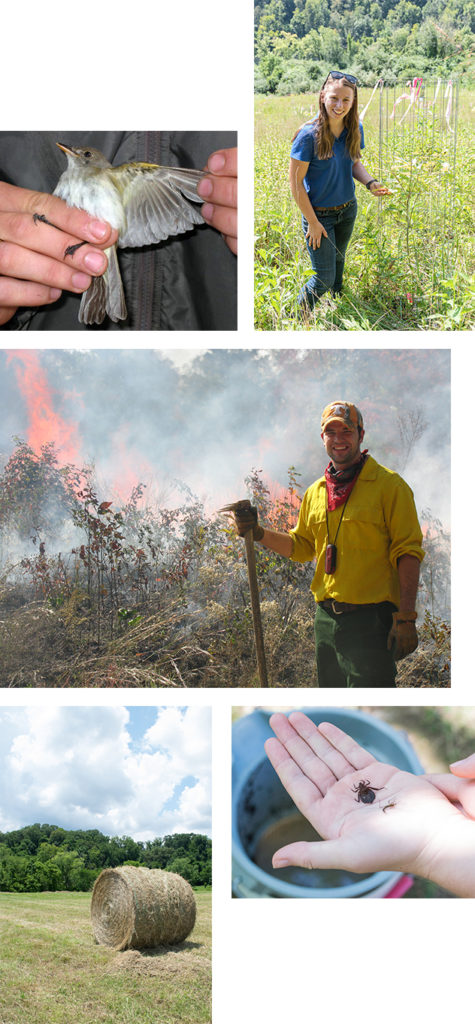The doctoral program with a major in natural resources emphasizes interdisciplinary research approaches toward the understanding and management of natural resources in a broad context. Areas of study include:
- Forest, wildlife and fisheries biology
- Ecosystem function and structure
- Natural resource economics and policy
- Human dimensions of natural resource management
- Wood sciences
- Multidisciplinary natural resources management
Admission Requirements
Applicants to the PhD program normally should have completed a master’s degree prior to beginning the doctoral program. Specific admission requirements include:
- A minimum grade point average of 3.0 on a 4.0 scale.
- While the SNR recommends prospective students take the Graduate Record Examination (GRE), it is not required for admission to the program. Since different faculty members use the scores from GRE test with different weights in their evaluation of prospective students, it is recommended that the applicants consult with the faculty member with whom they intend to work with to find out the importance of it.
- A written statement of your educational and professional goals (which is entered on UT Graduate Admissions online departmental information form—see below).
- Three recommendations from individuals capable of evaluating the applicant’s potential for graduate work in interdisciplinary natural resource management (see UT Graduate Admissions web pages for instructions on submitting recommendations).
Admission to the department is competitive. If applicants meet the minimum requirements for consideration, their files are circulated to potential major professors (graduate advisors). They are admitted only if a professor agrees to advise them. As a consequence, we deny admission to many students who meet the minimum requirements for admission due to the lack of an advisor. Because of this, students are advised not to formally apply unless they have contacted a professor and have been encouraged to do so. This saves the student time, money, and disappointment.

Degree Requirements
A candidate for the doctoral degree must complete 72 semester hours of coursework beyond the bachelor’s degree, and 48 hours must be in graduate coursework approved by the student’s doctoral committee. Up to 24 hours of master’s-level coursework may be applied to the 48-hour requirement. A minimum of six hours must be taken in UT courses at the 600-level, exclusive of dissertation hours. View a listing of the School graduate courses in the online Graduate Catalog.
Specific Requirements Are:
- Research Methods and Analysis (9 credits in at two of the subject areas):
- Research/Experimental Design
- Statistics/Econometrics/Biometrics
- GIS/Remote Sensing
- Core Subject areas (33 credits to be determined by doctoral committee)
- Professional Development (5 credits):
- Teaching: All students will be expected to complete FWF601 and assist in teaching a course during their tenure in the program.
- Professional Communications: All students will be required to complete FWF612 as part of their program of study. Part of the seminar requirement is assisting in the development and conduct of FWF512.
- FWF 600 Doctoral Research and Dissertation (24 credits).
A doctoral committee consisting of at least four faculty members must be identified by the student and major professor. At least two of the committee members must be from the Department of Forestry, Wildlife and Fisheries, and one member must be from outside the department. Three of the committee members, including the major professor, must be approved by the Graduate School to direct doctoral research. The committee should be formed during the first year of the student’s program.
All students are required to successfully complete an oral and written examination on all coursework completed as part of the PhD requirements. The exam is scheduled when the student has completed all or nearly all of the coursework. The PhD committee will determine the content, nature, and schedule of the comprehensive exam and certify the results.
During the first year, the student should develop a research prospectus that outlines the research problem to be addressed as part of his/her doctoral research. The prospectus is presented to the student’s committee, and the committee will approve the research topic and approach.
All students are required to complete, present, and defend a dissertation. The student should provide each member of the committee a copy of the dissertation at least two weeks prior to the scheduled defense. All students are required to present a seminar on their dissertation as part of the degree requirements. The seminar can be part of the dissertation defense or presented before the formal defense.
View the Graduate Student Handbook.
Minor in Environmental Policy
The department participates in a program designed to give graduate students an opportunity to develop an interdisciplinary specialization in environmental policy. View more information about the Environmental Policy minor.
